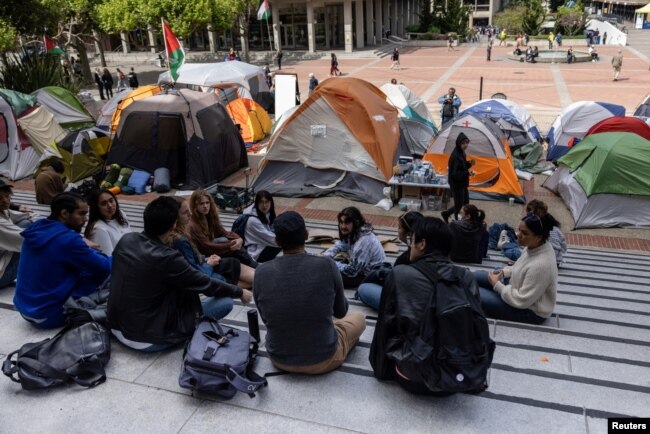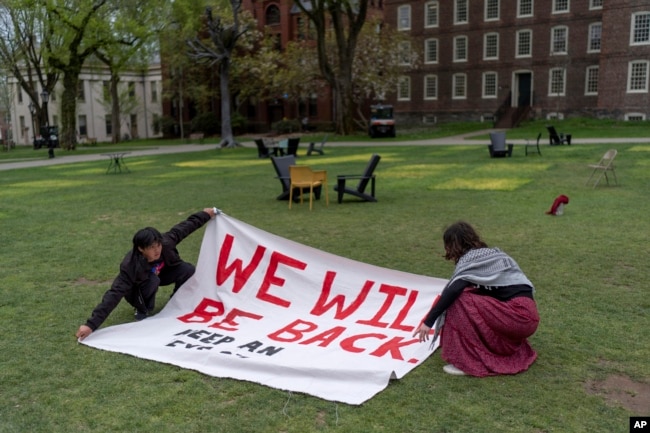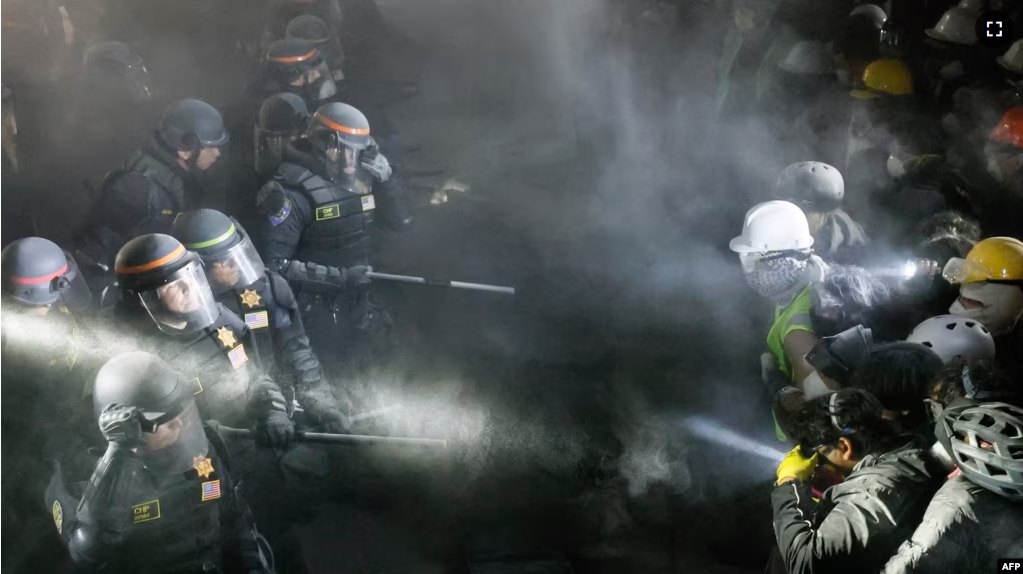Police have removed encampments, released tear gas and arrested protesters on college campuses around the United States.
At Columbia University, New York City police twice came to the school to arrest those who set up camps and occupied a building to protest Israel’s war in Gaza. Several hundred people have been arrested. Some students have been suspended and threatened with expulsion. Police are now stationed all day and night on campus.
Early Thursday, police began to remove a pro-Palestinian encampment at the University of California, Los Angeles (UCLA).
The Reuters news agency reported several loud explosions during the clash. Some demonstrators carried shields and umbrellas to block the police officers, shouting, “push them back.” Others surrendered and were moved with their hands over their heads by police. The arrests came one day after violence broke out between pro-Palestinian protesters and those who support Israel.
A different result at Berkeley
Nearly 600 kilometers north, the situation has been very different at the University of California, Berkeley. Student demonstrations have taken place so far without arrests or disruption to campus operations.
The contrast in how protests have developed at the top universities, with long histories of student activism, has been notable. The results show how college and law enforcement officials deal with events that can quickly turn into a crisis.
Several other schools, including Northwestern University in Illinois and Brown University in Rhode Island, have avoided clashes between police and students.

Education experts say these cases offer lessons in keeping tensions from rising. They say it is important for university officials to learn from experience and balance student activism with pressure from donors, outside groups and politicians.
Berkeley Chancellor Carol Christ has permitted students to maintain a protest space on campus on the steps of Sproul Hall since April 22. The building is where Martin Luther King, Jr. gave a 1967 civil rights speech.
Dan Mogulof is a spokesman for Berkeley. He said the protest space remained in effect Wednesday in the hours after UCLA and Columbia called police.
“UC Berkeley has long experience with nonviolent political protest,” Mogulof said. He added that the school was following the University of California system’s policy for demonstrations.
That guidance tells college administrators to avoid police involvement unless it is really necessary. Police are to be called when the physical safety of students, faculty and staff is threatened.
That policy is not normal for most schools. Most universities have rules that bar permanent encampments or overnight student activities on campus.
The University of California (UC) system has seen in the past where police involvement can lead.
In 2011, during the “Occupy” movement against economic inequality at Berkeley, campus police hit students with sticks. Then-Chancellor Robert J. Birgeneau later apologized, and the University of California system turned to the policy of restraint, spokesman Mogulof said.

Pro-Palestinian protesters are demanding that colleges end investments in Israel and in companies doing business with the Israeli army.
In Illinois, Northwestern University reached a deal with protesters. The activists agreed to remove tents and sound systems on campus in return for a new advisory committee on investments.
Protesters at Brown University in Rhode Island also agreed to take down their encampment in return for a vote by the college on whether to divest from companies tied to Israel’s military attacks on Gaza.
But some deals have failed to end tensions.
Portland State University in Oregon agreed to suspend donations from aircraft manufacturer Boeing. Boeing is the U.S. company that makes attack helicopters used in Gaza. But students there have continued their occupation of the library. The Associated Press says the campus was closed on Thursday because of police activity.
I’m Mario Ritter, Jr.
Hai Do adapted this report for VOA Learning English from Associated Press and Reuters sources.
_______________________________________________
Words in This Story
campus –n. the grounds of a school, college or institution
umbrella –n. folding coverings that block rain and sun
disruption –n. interference in a normal activity
contrast –n. a comparison that examines the differences between things
lesson –n. something that is learned from an event or situation
faculty –n. the group of educators at a school
staff –n. employees of an organization usually not including educators at a school or college
divest –v. to sell or exchange interest in an investment or financial entity
